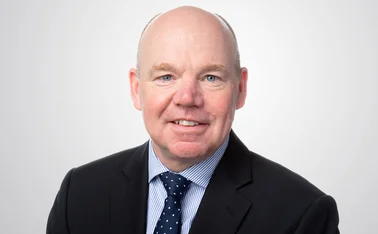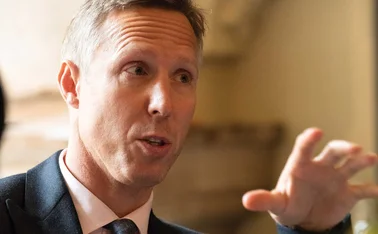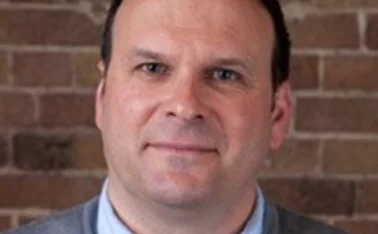
Opinion: Perry Appleton's Claire Russell on mental health in business

Time for action on mental health: As Insurance Age launches the Head Lines mental health campaign, broker and mental health expert Claire Russell shares her own experience.
When I began my insurance broking career at just 17, I did not imagine that I would still be here 23 years later. But then, I also did not imagine having a mental breakdown in my 30s.
In my 20s I recall discussing mental health with friends, saying: “I’m not the type of person to have mental health problems.” I believed that then – I felt invincible, I was sure I could do anything I wanted. It never occurred to me that I might have a chink in my armour.
It no longer surprises me that I have experienced mental health problems. I’m not ashamed of it and I talk openly about my battle with depression and anxiety. I know now that mental illness is an equal opportunity gig – it can affect anyone. The latest statistics show that mental illness is the largest single source of burden of disease in the UK and in 2018 there were 6,507 suicides in the UK – a significant increase on the prior year and the first increase since 2013.
What does surprise me, still, is the disparity between the way that we view physical health and mental/emotional health – especially the way we manage ill health in the workplace.
Early in my career, age 18, I needed a major operation due to a physical health problem. I was off work for months and I was fully supported by my employer and colleagues. My work-mates came to see me in hospital and later at home. I was sent flowers and cards and, when it was time for me to return to work, I was given lots of support.
Twenty years later, I experienced a mental/emotional breakdown. It didn’t happen overnight – the cumulative effect of stress and a lack of self-care led to my breakdown. I found myself standing on a railway platform one day just wanting the pain to go away. I contemplated stepping off the platform, but thankfully I did not. That day was the rock bottom and the start of a journey to recovery.
In contrast to my earlier physical health problems, the lack of support available was astounding. I don’t blame anyone for that – no one knew how to talk about my mental illness, everyone was afraid to say the wrong thing, and so they said nothing.
Business owners, business leaders and managers must start taking tangible action on mental wellbeing at work. There is considerable evidence that businesses that invest in a mental health strategy see a reduction in absence, less presenteeism and increased employee satisfaction
Human cost
My experience is typical. We have to create workplace conditions in which people feel comfortable to talk about their mental health and are given the support they need. In most cases, people with mental health issues are capable of recovery and can often remain at work.
Studies have shown that poor mental health costs the insurance industry (in absenteeism, presenteeism and turnover) £2,017 to £2,564 per person employed (not per person with mental health issues). This is the highest cost per head in the private sector. And, the human cost – to relationships, to families, in jobs lost and in lives lost – is incalculable.
It is very clear that there has been a huge increase in awareness around mental health in the last three years. The conversation has opened up and most organisations are aware of their legal and moral responsibilities to provide physically and mentally safe workplaces. After all, you do not expect to go to work and be physically injured, so why should you not expect the same when it comes to mental health?
This increase in awareness is great, but it is not enough. 2020 has to be the year for action.
Business owners, business leaders and managers must start taking tangible action on mental wellbeing at work. There is considerable evidence that businesses that invest in a mental health strategy see a reduction in absence, less presenteeism and increased employee satisfaction.
Importantly, for those with an eye on financial performance, research shows the return on investment on early stage supporting activities, such as culture change initiatives, mental health de-stigmatisation campaigns and training, is as high as 8:1. For early stage proactive interventions, such as mental health first aid training, this can be up to 6:1.
It is time that all businesses made a commitment to taking practical action on mental and emotional wellbeing at work.
Claire Russell is a broker with Perry Appleton, TedX speaker, and also runs Mental Health in Business, which helps train people on mental health in the workplace.
Only users who have a paid subscription or are part of a corporate subscription are able to print or copy content.
To access these options, along with all other subscription benefits, please contact info@insuranceage.co.uk or view our subscription options here: https://subscriptions.insuranceage.co.uk/subscribe
You are currently unable to print this content. Please contact info@insuranceage.co.uk to find out more.
You are currently unable to copy this content. Please contact info@insuranceage.co.uk to find out more.
Copyright Infopro Digital Limited. All rights reserved.
As outlined in our terms and conditions, https://www.infopro-digital.com/terms-and-conditions/subscriptions/ (point 2.4), printing is limited to a single copy.
If you would like to purchase additional rights please email info@insuranceage.co.uk
Copyright Infopro Digital Limited. All rights reserved.
You may share this content using our article tools. As outlined in our terms and conditions, https://www.infopro-digital.com/terms-and-conditions/subscriptions/ (clause 2.4), an Authorised User may only make one copy of the materials for their own personal use. You must also comply with the restrictions in clause 2.5.
If you would like to purchase additional rights please email info@insuranceage.co.uk







